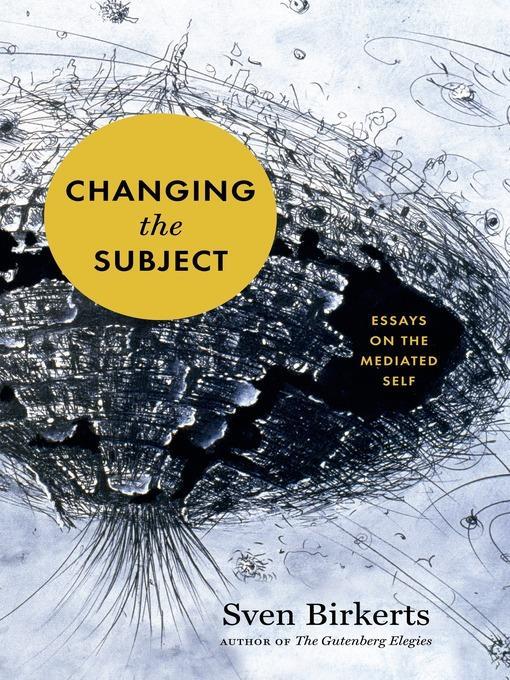
Changing the Subject
Art and Attention in the Internet Age
کتاب های مرتبط
- اطلاعات
- نقد و بررسی
- دیدگاه کاربران
نقد و بررسی

August 10, 2015
In this anxious and rapturous book of essays, all previously published in literary magazines, Birkerts (The Gutenberg Elegies) posits the decline of “literary reading” and argues that the importance of the individual—the subjective “I” so central to Enlightenment culture—diminishes along with it. For Birkerts, the value in reading imaginative writing (fiction, poetry, even certain essays) doesn’t lie in the accumulation of plots or perspectives, but the exercise of empathetic attention. Increasingly sophisticated technologies, he fears, are irreversibly rewiring our brains in such a way that dissolves contemplation in the acid anxiety of the Internet’s endless possibility—the daily news cycle, social media, instant entertainment, and the knowledge that with your smartphone you can reach and be reached at any time. The present (not to mention the future) is more like Jorge Luis Borges’s vertiginous “library of Babel” than the rosy prognostications of the “digerati,” as Birkerts calls tech entrepreneurs, journalists, digital librarians, and (groan) young people. Birkerts has a knack for vividly conveying the phenomenology of reading fiction, and, drawing on the work of the Romantics, is convincing on the topic of its moral value. At the same time, he might do well to show he knows that reading novels was not so long ago condescended to as an unserious, even morally hazardous, activity.

July 1, 2015
A literary critic questions the effect of digital technology on minds, literature, and creativity. Although he uses computers, email, and GPS, Birkerts (The Other Walk: Essays, 2011, etc.), director of the Bennington Writing Seminars and editor of the literary journal AGNI at Boston University, wonders how those technologies have changed both the content they convey and users' connections to "the unmediated world...are these fabulous gains of access and ease really given without a counterbalancing sacrifice?" That choice of the word "sacrifice" reflects the author's suspicion, reiterated in many of these previously published essays, that "new technologies and behaviors have a way of encroaching almost visibly" to change the way we think-usually for the worst. When we use a search engine, he asserts, "we give over any real sense of control over our contexts...making ourselves that much more fit to be nodes in a larger system, that much less our independent selves." When we use GPS, we risk "floating weightlessly from here to there without a strong notion of origins or destination." Birkerts points to studies in neuroscience that find "short-term adaptations and neural reconfigurings" as a result of "digital expansion." Long-term effects, he acknowledges, are still unknown. The author worries, especially about the possibility that imagination may become compromised "every time another digital prosthesis appears and puts another thin layer of sheathing between ourselves and the essential givens of our existence." He also worries that these prostheses give us a skewed sense of agency and power; in his opinion, agency is being diminished: "If being a Luddite has come to mean refusing to rubber-stamp without questioning everything that passes for progress, then where do I sign up?" Following the visual paths of paintings, listening intently to a musical composition, and reading books, he insists, are analogous to prayer. Cogent and thoughtful, if nostalgic, essays urging our attention not to iPads and smartphones but to art.
COPYRIGHT(2015) Kirkus Reviews, ALL RIGHTS RESERVED.

September 1, 2015
For Birkerts (The Gutenberg Elegies), agency once meant something as simple as brushing dust from the needle of a record player and setting it to play once more. It meant mapping one's own road, sans GPS, or setting aside distractions to sink into the imaginary world found in a book. Like Susan Greenfield (Mind Change) and other technology skeptics, Birkerts argues in this collection of essays that humanity is evolving a less than desirable pattern of thought and behavior as we uncritically accept new technologies. Birkerts points to the plasticity of the human brain and suggests that we must, necessarily, be changed for the worse by our twitchy texting, googling, and e-reading. He makes his argument most compellingly as he describes his experience as a reader--how the physical text allows him to pursue a sustained thought, a unique reflection that leads to his own creative act. Birkerts warns that society will lose a great deal if it no longer cultivates focus, introspection, and individuality by encouraging its members to step off the grid and imagine a little for themselves. VERDICT Recommended for readers seeking a literary take on the philosophy and psychology of technological change.--Talea Anderson, College Place, WA
Copyright 2015 Library Journal, LLC Used with permission.

October 1, 2015
There is little doubt that the twenty-first century will be henceforth known as the digital age. Smartphones, tablets, and e-readers are ubiquitous; Google Search and Wikipedia have forever changed the way information, if not knowledge, is gained. But has this immediate connectivity and instantaneous gratification improved humanity? Or has it weakened the ability to focus, engage, and absorb on a more meaningful level? In essays that explore the disconcerting presence of GPS navigation, Siri's seductive helpfulness, impermanence of imaginative impulses, and loss of the attention span required to lose oneself in a good book, Birkerts extends the examination of technophilia that began with his prophetic The Gutenberg Elegies (1994). Birkerts is not categorically opposed to new technology, a subject he gamely embraces in It's Not Because I'm a Cranky Luddite, I Swear! Rather, he recognizes that while much is gained, some things may be irrevocably lost as we rely on machines to perform essential human functions. Erudite and entertaining, Birkerts offers a perspective on the techno-human interface that will resonate with all who question the omnipresence of digital technology.(Reprinted with permission of Booklist, copyright 2015, American Library Association.)

























دیدگاه کاربران